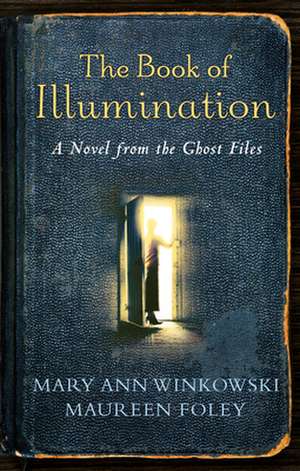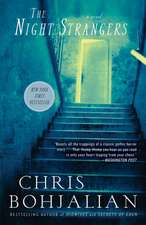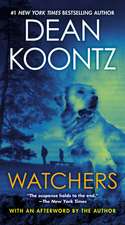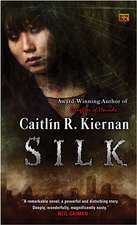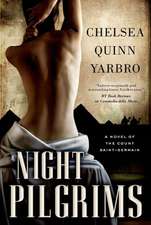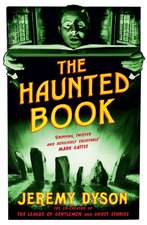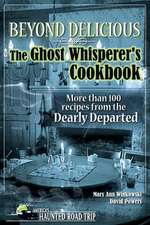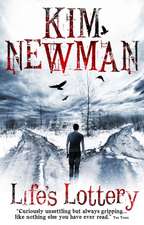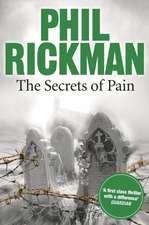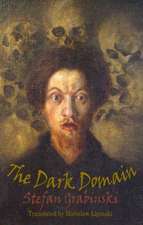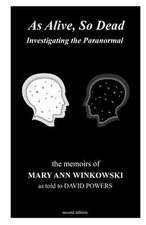The Book of Illumination: A Novel from the Ghost Files
Autor Mary Ann Winkowski, Maureen Foleyen Limba Engleză Paperback – 30 sep 2009
Anza O'Malley is in most ways a typical single mom. She lives a happy, busy life with her five-year-old son in Cambridge, Massachusetts, juggling the joys and challenges of life as a doting parent and a freelance bookbinder. But there is more to Anza than meets the "ungifted" eye: she can see and speak with ghosts.
Although she's been solving cold cases for the police for years, Anza has been hoping to focus her energies on her son and her bookbinding career. But when an exquisite and priceless illuminated manuscript is stolen from the Boston Athenaeum, and when its desecration spurs the appearance of some very unhappy spirits, Anza can neither look nor walk away. With an unlikely trio of ghosts by her sideߝa charming butler and two medieval monksߝAnza leads us on an urgent journey through Boston's winding, cobbled streets to uncover a trail of deceit, danger, and ghoulish intrigue.
Preț: 112.11 lei
Nou
Puncte Express: 168
Preț estimativ în valută:
21.46€ • 23.16$ • 17.99£
21.46€ • 23.16$ • 17.99£
Carte disponibilă
Livrare economică 28 martie-11 aprilie
Preluare comenzi: 021 569.72.76
Specificații
ISBN-13: 9780307452443
ISBN-10: 0307452441
Pagini: 320
Dimensiuni: 133 x 203 x 18 mm
Greutate: 0.24 kg
Editura: BROADWAY BOOKS
ISBN-10: 0307452441
Pagini: 320
Dimensiuni: 133 x 203 x 18 mm
Greutate: 0.24 kg
Editura: BROADWAY BOOKS
Notă biografică
MARY ANN WINKOWSKI is the author of When Ghosts Speak. She is a paranormal investigator who has collaborated closely with several federal agencies and is the high-profile consultant for the CBS series The Ghost Whisperer. Visit her online at www.maryannwinkowski.com.
MAUREEN FOLEY is the acclaimed writer, producer, and director of the films American Wake and the award-winning Home Before Dark. Visit her online at www.hazelwoodfilms.com.
MAUREEN FOLEY is the acclaimed writer, producer, and director of the films American Wake and the award-winning Home Before Dark. Visit her online at www.hazelwoodfilms.com.
Extras
I should not have answered the phone.
But that's one more thing they fail to mention in those books you buy to try to prepare for parenthood. What the books should say is this: unless your child is in sight or within shouting distance, you will never again be comfortable letting a phone ring.
My five-year-old, Henry, was spending the weekend with his father, Declan; his stepmother, Kelly; and his two half sisters, Delia and Nell. Kelly's brother has a cottage on Lake Sunapee, and since it was Columbus Day weekend, which happened to fall very early this year, they'd all set off on Friday for three days of boating and campfires.
"Anza? It's Nat."
"Oh, hi!"
My friend Natalie was everything I wasn't: cool, willowy, able to get through life with a few faultlessly chosen pieces of clothing—one cashmere sweater, one black pencil skirt, one perfect pair of jeans. The jewelry she made was just like her wardrobe, spare and tasteful. She was also a secret smoker with somewhat unfortunate taste in men.
"What are you doing?" she asked.
"Nothing." I had just settled down with a glass of Sancerre and a DVD.
"Nothing?"
"Well, I was just about to fire up the third season of 24."
"Oh!" She sounded a little too enthusiastic. With anyone else, I'd wonder if they were angling for an invitation. But Nat
didn't need one, any more than I needed to call before showing up at her place or her grandmother's. Pasquina, Nat's grandmother, had grown up with my nona in Palermo. I'd appeased Nona's early fears about my living alone in Boston by spending every Sunday with her childhood friend and the dozens of relatives and hangers- on who floated in and out of three family apartments in the same building in Boston's Italian North End.
I could hear many of these relatives in the background right now. Maybe Nat needed out.
"You want to come over?"
"No, no, I can't, but . . . listen. You remember Sylvia Cremaldi?"
At the mention of the name, I recalled Sylvia's pale and worried face, the face of someone who grew up hearing nothing but "No!"
"I think so."
"She was ahead of us."
We'd attended the North Bennet Street School, where Nat got her training in jewelry making and I learned the deeply rewarding yet highly impractical and not very lucrative trade of bookbinding. Well, I had to do something. Books seemed . . . logical. I'd just spent four years as an En glish major, and reading was what I did. Reading is what I would still be doing, if I could pay my rent by lying on the couch with a good novel.
"She did that folio of Danish woodcuts," Nat went on.
"Yeah, I remember."
She paused, possibly distracted by what sounded like a platter hitting the floor, followed by lots of yelling.
"She got a job at the Athenaeum."
The Boston Athenaeum was one of the oldest private lending libraries in America. It was located in a jewel of a building on Beacon Hill.
What I said was, "Really? That's fantastic."
What I thought was, I'd kill to get a job there! How come she got it?
To which I answered myself, She stopped waiting for the people conducting the door- to- door search for bookbinders specializing in bookcalf and marbled boards. She went looking for a job, and when she found that one, she applied.
"Well," Nat said, "they seem to be having a little problem."
"What kind of problem?"
"Your kind."
I knew it. Nat had dropped her voice to a whisper, maintaining the illusion that this was just between us— that is, if you didn't count all the relatives who were probably standing around the phone: Pasquina and Nat's aunt, Marcella, and of course Camille, and probably Nat's brother, Franco.
"Would you just . . . talk to her? She's kind of freaked out."
I let out a beleaguered sigh. I really didn't want to get involved in this. I took a sip of my wine and stared at the paused image on my TV screen: a fuzzy Jack Bauer with a cell phone pressed to his ear.
"Are you there?" Nat asked.
"I'm here." Here, and feeling guilty. According to Nona, who may not have read the Bible but who sure had listened to her share of Sunday sermons, the problem- solving ability Nat was hoping to enlist fell into the category of talents one was not supposed to bury, and lights one was not supposed to "hide under a barrel."
This parable had baffled me as a child. Not that I didn't understand the message, but hearing the story always brought to mind the image of a circle of Old Testament guys in robes and beards placing a wooden basket— the kind we used for apples and garden clippings— over a lighted candle, which even a kid knows is a bad idea.
I sighed again.
"Okay," said Nat. "I get it." And she did, which was one reason why I loved her. But I'd moved halfway across the country to get away from all this: from the police and the FBI and strangers calling me up in the middle of the night to drag me into messes I had no part in creating and would just as soon not even have known about, thank you very much.
I didn't have a choice when I was a kid. But I wasn't a kid anymore.
And Nat wasn't a stranger. She was the closest thing I had to a sister.
"Okaaaaay."
"You don't have to. Really."
"I know. You think she can keep quiet?"
"She's desperate. She'll do anything you ask."
Nat paused, and when I didn't respond, went on. "The Athenaeum is closed tomorrow, but she has a key. She said she could meet you anytime."
"Tell her I'll come by around eleven."
"Thanks. And just so you know, this wasn't my idea."
"Pasquina?"
"Marcella. Sylvia's mom was in her wedding."
Given the way Nat's family had folded me in when I first moved to Boston, this practically made Marcella my aunt.
We chatted for a few more minutes before hanging up. I don't remember finishing my wine, but I must have. I thought about pouring another glass but decided against it. I was always kind of lonesome on Sunday afternoons, especially as darkness started to fall, especially in the autumn, especially if I let myself start thinking about Nona and Dad back in Cleveland, and how they were probably missing me, too, and wondering why Henry and I had to live so far away.
What was Daddy doing right now? Was he down at his workbench in the basement, putting a coat of varnish on something he would give to one of us? Sitting at the kitchen table as the afternoon light faded, wearing a flannel shirt and his old reading glasses, the radio on low, leafing through Yankee magazine or the ads in the Sunday paper?
What do you do, when you're seventy- one and the kids you struggled so hard to raise are grown and gone? Do you think about the drunk driver who picked off your bride in the middle of a May afternoon while she was walking to collect your boys at her mother's with your only daughter in a stroller? Do you go back to Ireland and attempt to resume a life you left off four decades ago, when there was not a lick of work to be had, for carpenters or anyone else? Do you throw in your lot with snowbirds like the Costellos and Colm and Ann McInerny, flying south for a condo on a golf course?
I have no idea what you do if you're Owen James O'Malley. I only know what you don't do. Complain.
So, about that other . . . uh, aspect of things. It's kind of hard to explain, but here goes.
I am not musical. Even though I love to listen to jazz and old time and anything Joni Mitchell ever sang, I myself couldn't hum a recognizable "Jingle Bells," much less write it.
But I once saw a musical prodigy being interviewed on 60 Minutes. He couldn't have been more than ten or eleven, and all his life, people had been comparing him to Mozart, who was entertaining kings and princes by the time he was six and writing symphonies soon after that.
Morley Safer or Dan Rather, or whoever it was, asked him if he could describe what went on for him as he wrote music. And this little boy said that it didn't really feel as if he were composing it; he was just copying it down. He didn't sit there trying to come up with a melody. He just listened for it in the air, and there it was. It was the same with harmonies and all the different parts. He just listened for the moments when the instruments floated in and out, all the time writing as fast as he possibly could.
It's kind of like that for me, too.
Whereas most people hear everyday sounds in the air— a siren in the distance, a power drill a few yards over, birds, cars— he hears music. A quartet. A symphony.
And where he hears music, I hear, and see, and can speak with . . .
Ghosts.
But that's one more thing they fail to mention in those books you buy to try to prepare for parenthood. What the books should say is this: unless your child is in sight or within shouting distance, you will never again be comfortable letting a phone ring.
My five-year-old, Henry, was spending the weekend with his father, Declan; his stepmother, Kelly; and his two half sisters, Delia and Nell. Kelly's brother has a cottage on Lake Sunapee, and since it was Columbus Day weekend, which happened to fall very early this year, they'd all set off on Friday for three days of boating and campfires.
"Anza? It's Nat."
"Oh, hi!"
My friend Natalie was everything I wasn't: cool, willowy, able to get through life with a few faultlessly chosen pieces of clothing—one cashmere sweater, one black pencil skirt, one perfect pair of jeans. The jewelry she made was just like her wardrobe, spare and tasteful. She was also a secret smoker with somewhat unfortunate taste in men.
"What are you doing?" she asked.
"Nothing." I had just settled down with a glass of Sancerre and a DVD.
"Nothing?"
"Well, I was just about to fire up the third season of 24."
"Oh!" She sounded a little too enthusiastic. With anyone else, I'd wonder if they were angling for an invitation. But Nat
didn't need one, any more than I needed to call before showing up at her place or her grandmother's. Pasquina, Nat's grandmother, had grown up with my nona in Palermo. I'd appeased Nona's early fears about my living alone in Boston by spending every Sunday with her childhood friend and the dozens of relatives and hangers- on who floated in and out of three family apartments in the same building in Boston's Italian North End.
I could hear many of these relatives in the background right now. Maybe Nat needed out.
"You want to come over?"
"No, no, I can't, but . . . listen. You remember Sylvia Cremaldi?"
At the mention of the name, I recalled Sylvia's pale and worried face, the face of someone who grew up hearing nothing but "No!"
"I think so."
"She was ahead of us."
We'd attended the North Bennet Street School, where Nat got her training in jewelry making and I learned the deeply rewarding yet highly impractical and not very lucrative trade of bookbinding. Well, I had to do something. Books seemed . . . logical. I'd just spent four years as an En glish major, and reading was what I did. Reading is what I would still be doing, if I could pay my rent by lying on the couch with a good novel.
"She did that folio of Danish woodcuts," Nat went on.
"Yeah, I remember."
She paused, possibly distracted by what sounded like a platter hitting the floor, followed by lots of yelling.
"She got a job at the Athenaeum."
The Boston Athenaeum was one of the oldest private lending libraries in America. It was located in a jewel of a building on Beacon Hill.
What I said was, "Really? That's fantastic."
What I thought was, I'd kill to get a job there! How come she got it?
To which I answered myself, She stopped waiting for the people conducting the door- to- door search for bookbinders specializing in bookcalf and marbled boards. She went looking for a job, and when she found that one, she applied.
"Well," Nat said, "they seem to be having a little problem."
"What kind of problem?"
"Your kind."
I knew it. Nat had dropped her voice to a whisper, maintaining the illusion that this was just between us— that is, if you didn't count all the relatives who were probably standing around the phone: Pasquina and Nat's aunt, Marcella, and of course Camille, and probably Nat's brother, Franco.
"Would you just . . . talk to her? She's kind of freaked out."
I let out a beleaguered sigh. I really didn't want to get involved in this. I took a sip of my wine and stared at the paused image on my TV screen: a fuzzy Jack Bauer with a cell phone pressed to his ear.
"Are you there?" Nat asked.
"I'm here." Here, and feeling guilty. According to Nona, who may not have read the Bible but who sure had listened to her share of Sunday sermons, the problem- solving ability Nat was hoping to enlist fell into the category of talents one was not supposed to bury, and lights one was not supposed to "hide under a barrel."
This parable had baffled me as a child. Not that I didn't understand the message, but hearing the story always brought to mind the image of a circle of Old Testament guys in robes and beards placing a wooden basket— the kind we used for apples and garden clippings— over a lighted candle, which even a kid knows is a bad idea.
I sighed again.
"Okay," said Nat. "I get it." And she did, which was one reason why I loved her. But I'd moved halfway across the country to get away from all this: from the police and the FBI and strangers calling me up in the middle of the night to drag me into messes I had no part in creating and would just as soon not even have known about, thank you very much.
I didn't have a choice when I was a kid. But I wasn't a kid anymore.
And Nat wasn't a stranger. She was the closest thing I had to a sister.
"Okaaaaay."
"You don't have to. Really."
"I know. You think she can keep quiet?"
"She's desperate. She'll do anything you ask."
Nat paused, and when I didn't respond, went on. "The Athenaeum is closed tomorrow, but she has a key. She said she could meet you anytime."
"Tell her I'll come by around eleven."
"Thanks. And just so you know, this wasn't my idea."
"Pasquina?"
"Marcella. Sylvia's mom was in her wedding."
Given the way Nat's family had folded me in when I first moved to Boston, this practically made Marcella my aunt.
We chatted for a few more minutes before hanging up. I don't remember finishing my wine, but I must have. I thought about pouring another glass but decided against it. I was always kind of lonesome on Sunday afternoons, especially as darkness started to fall, especially in the autumn, especially if I let myself start thinking about Nona and Dad back in Cleveland, and how they were probably missing me, too, and wondering why Henry and I had to live so far away.
What was Daddy doing right now? Was he down at his workbench in the basement, putting a coat of varnish on something he would give to one of us? Sitting at the kitchen table as the afternoon light faded, wearing a flannel shirt and his old reading glasses, the radio on low, leafing through Yankee magazine or the ads in the Sunday paper?
What do you do, when you're seventy- one and the kids you struggled so hard to raise are grown and gone? Do you think about the drunk driver who picked off your bride in the middle of a May afternoon while she was walking to collect your boys at her mother's with your only daughter in a stroller? Do you go back to Ireland and attempt to resume a life you left off four decades ago, when there was not a lick of work to be had, for carpenters or anyone else? Do you throw in your lot with snowbirds like the Costellos and Colm and Ann McInerny, flying south for a condo on a golf course?
I have no idea what you do if you're Owen James O'Malley. I only know what you don't do. Complain.
So, about that other . . . uh, aspect of things. It's kind of hard to explain, but here goes.
I am not musical. Even though I love to listen to jazz and old time and anything Joni Mitchell ever sang, I myself couldn't hum a recognizable "Jingle Bells," much less write it.
But I once saw a musical prodigy being interviewed on 60 Minutes. He couldn't have been more than ten or eleven, and all his life, people had been comparing him to Mozart, who was entertaining kings and princes by the time he was six and writing symphonies soon after that.
Morley Safer or Dan Rather, or whoever it was, asked him if he could describe what went on for him as he wrote music. And this little boy said that it didn't really feel as if he were composing it; he was just copying it down. He didn't sit there trying to come up with a melody. He just listened for it in the air, and there it was. It was the same with harmonies and all the different parts. He just listened for the moments when the instruments floated in and out, all the time writing as fast as he possibly could.
It's kind of like that for me, too.
Whereas most people hear everyday sounds in the air— a siren in the distance, a power drill a few yards over, birds, cars— he hears music. A quartet. A symphony.
And where he hears music, I hear, and see, and can speak with . . .
Ghosts.
Recenzii
"Absorbing from the first page."
—Buffalo News
"An engaging story"
—Irish America Magazine
"The captivating, completely engrossing story provides a glimpse into the realm of the paranormal."
—TucsonCitizen.com
"An authentic ghost whisperer reveals the workings of her mind and heart in this absorbing novel that sheds light on earthbound spirits in need of guidance home. An illuminating tale."
—Cleo Coyle, national bestselling author of The Haunted Bookshop Mysteries
"Engaging characters, clever twists . . . bright and spirited in every sense of the word. The Book of Illumination will light up your To-Be-Read list. An otherworldly delight."
—Kate Collins, author of the Flower Shop Mystery series
—Buffalo News
"An engaging story"
—Irish America Magazine
"The captivating, completely engrossing story provides a glimpse into the realm of the paranormal."
—TucsonCitizen.com
"An authentic ghost whisperer reveals the workings of her mind and heart in this absorbing novel that sheds light on earthbound spirits in need of guidance home. An illuminating tale."
—Cleo Coyle, national bestselling author of The Haunted Bookshop Mysteries
"Engaging characters, clever twists . . . bright and spirited in every sense of the word. The Book of Illumination will light up your To-Be-Read list. An otherworldly delight."
—Kate Collins, author of the Flower Shop Mystery series
Descriere
The criminal underworld collides with the spiritual otherworld in this thrilling fiction debut from Winkowski, the author of "When Ghosts Speak," and Foley, an award-winning writer and director.
